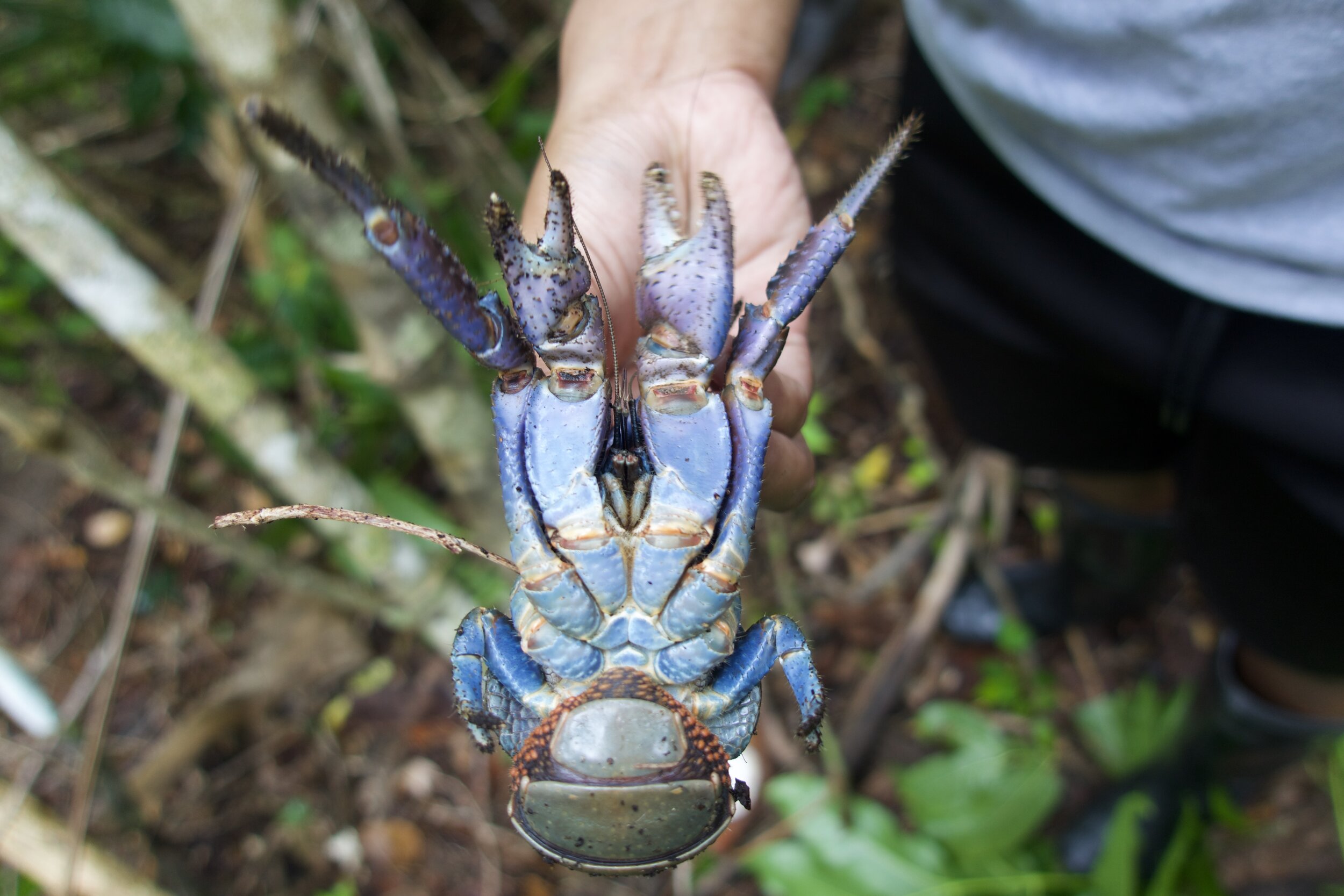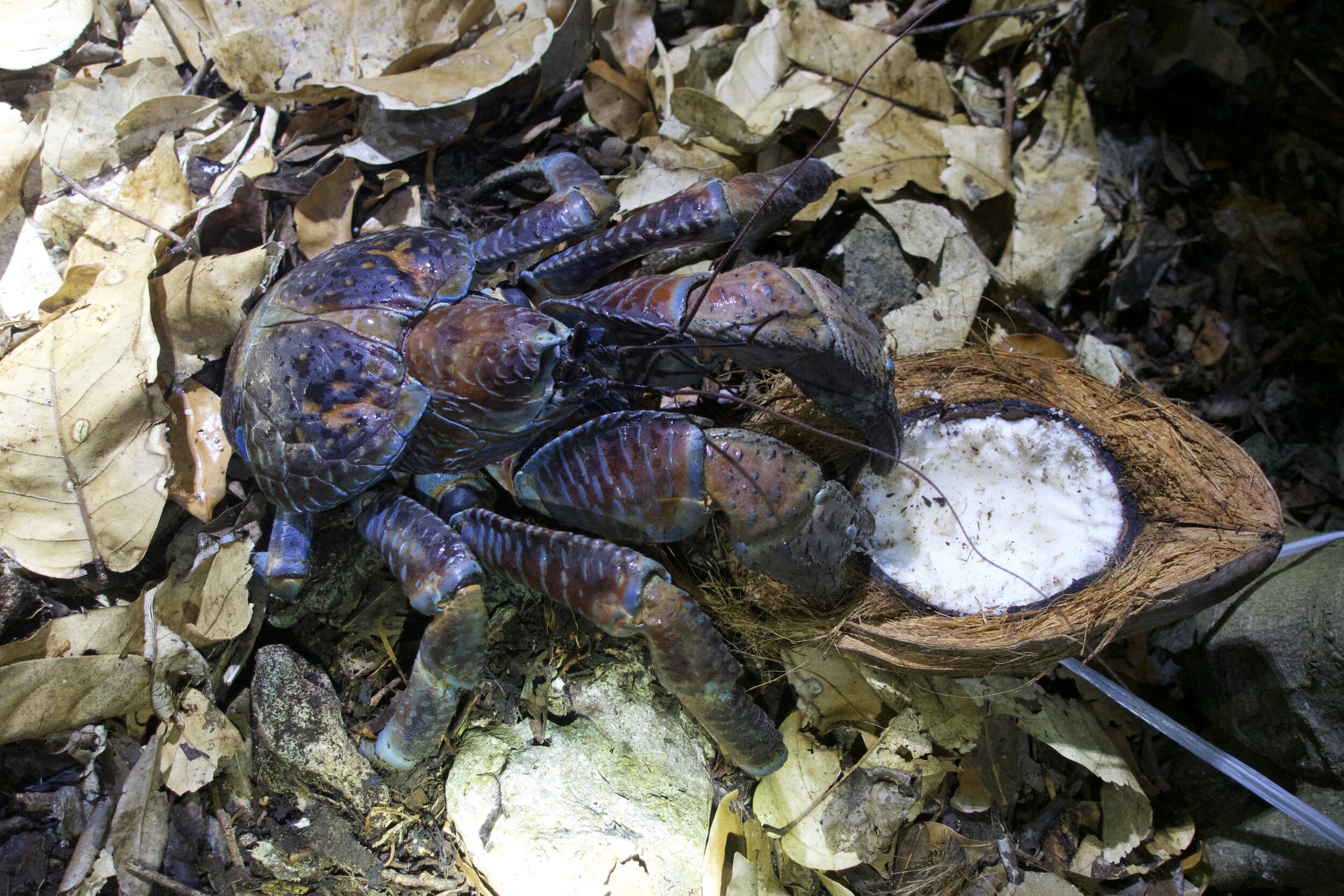Improving the sustainable management of coconut crabs in Fiji
Written by Epeli Loganimoce, USP-IMR and Katy Fatiaki, Vatuvara Foundation.
A team of Fijian scientists from the University of the South Pacific Institute of Marine Resources under the Pacific-European Union Marine Partnership Programme (PEUMP), Ministry of Fisheries and Vatuvara Foundation have completed a three-week survey in the remote islands of Fiji’s northern Lau group. Our goal was to study the world’s largest terrestrial invertebrate, the coconut crab (Birgus Latro) or known locally as Ugavule.
A coconut crab captured for identification. Photo by Katy Fatiaki, Vatuvara Foundation.
This is the first systematic study conducted in Fiji on the species distribution and abundance, to improve the profile for coconut crabs, provide stringent management recommendations and community-based training on resource management.
The survey team and team assistants on location in the northern Lau group. Photo by Katy Fatiaki, Vatuvara Foundation.
Coconut crabs can weigh up to 4 kilograms with a leg span exceeding 1 meter and are known to have remarkable claw strength. The team trekked at night through the remote limestone terrain to better understand these unique creatures. A notable finding was how effectively the managed protected areas assisted in safeguarding the species and preserving critical habitats. For the past 11 years, the Vatuvara Foundation and Vatuvara Private Islands have committed to safeguard two of the islands surveyed as crucial island reserves for Fiji’s protected coconut crabs and wildlife.
The team from Vatuvara, USP-IMR and Ministry of Fisheries conducting surveys at night, when coconut crabs are found to be most active. Photo by Katy Fatiaki, Vatuvara Foundation.
Coconut crabs are known to forage at night, however, we found that in undisturbed areas and with abundant food sources, crabs were discovered foraging during the day as well. The dense forest and coastal habitats provide ideal habitats for the coconut crabs to burrow and shelter into crevices.
Coconut crabs found gathered around a food source. Photo by Katy Fatiaki, Vatuvara Foundation.
Populations are rapidly declining or have become extinct locally due to habitat destruction, predation and human consumption. Coconut crab’s flesh is considered a local delicacy in the Pacific, and in Fiji are hunted to supply commercial markets. Locals have experienced that their hunting efforts have changed dramatically over the recent past. According to them, while hunting effort have increased, the catch has decreased significantly in numbers and sizes. They confirmed that it is now difficult to find bigger sized individuals compared to the last ten years. They also mentioned that in the past, coconut crabs were plentiful, and it was always easy and quick to collect them, but this is no longer the case. Even more challenging, the current COVID–19 pandemic has placed more pressure on coconut crab stocks and if not monitored and controlled, populations across Fiji will most likely diminish within the next ten years. The lack of available data and awareness capacity on coconut crabs has hindered any effective management.
Coconut crabs are protected by law in Fiji, although there is limited education and awareness regarding the regulation of coconut crabs at a local level. Coconut crabs are listed under Schedule 1, Part 9 of Fiji’s Endangered and Protected Species (Amendment) Act 2017. This policy controls the “international trade, domestic trade, possession and transportation” of coconut crabs safeguarded under CITES. The surveys currently underway through collaborative research partners will help to inform management decisions to conserve the remaining populations, such as establishing a legal minimum size limit, develop seasonal and area closures when crabs are reproductively active, ban or control exports, and also monitor compliance on harvest of coconut crabs.
Coconut crab found climbing various trees in the island habitats surveyed. Photo by John Fatiaki, Vatuvara Private Islands.
A comprehensive collaborative report on the baseline results of the stock assessment of coconut crabs across Fiji, will improve awareness of the cultural importance, ecology and conservation status of coconut crabs. Conservation directives for coconut crabs in Fiji would help maintain current stocks, establish new populations within their suitable habitats and help build capacity for local communities to take ownership in managing of their natural resources.
Coconut crab recorded feeding on coconut bait along survey station. Photo by Katy Fatiaki, Vatuvara Foundation.






